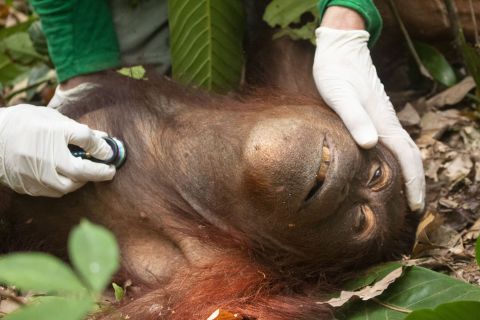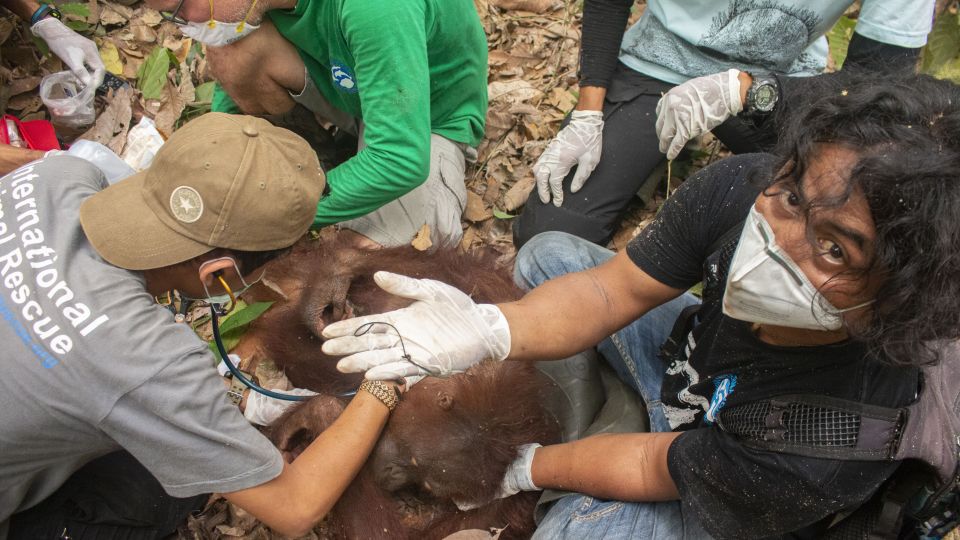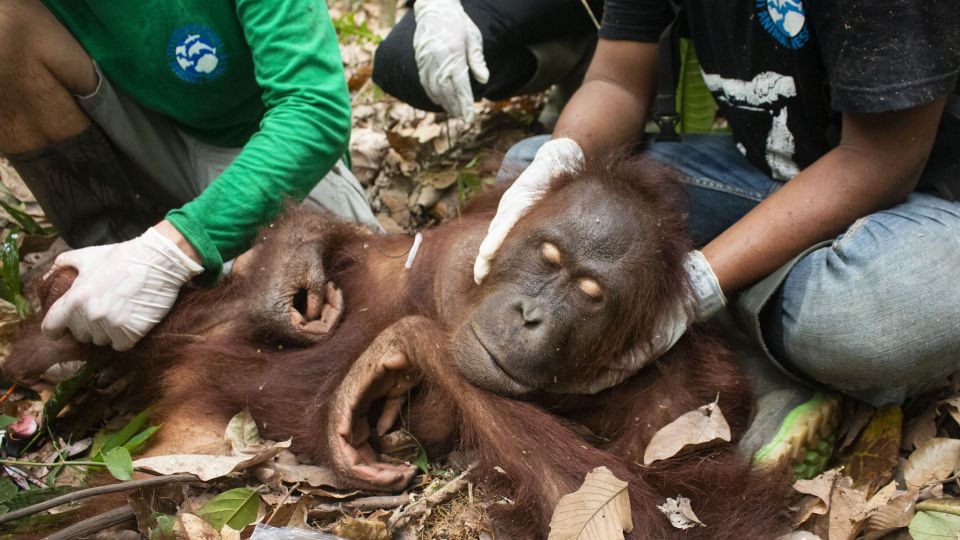
After miraculously freeing himself from a deadly snare, a young male orangutan has been rescued after being caught up in forest fires sweeping across Indonesia.
Our team in Indonesia, in collaboration with the Natural Resources Conservation Centre (BKSDA), has been called out urgently to rescue yet another orangutan left stranded and starving as a result of forest and land fires.
The orangutan had wandered into a rubber plantation in a desperate search for food, after being forced out of his forest home by deadly fires that have been burning for the past two months. The young male is believed to be just seven years old, suffering not just from a lack of food and water, but also from a deep infected wound on his leg caused by a snare. Once safely anaesthetised, initial medical assessments confirmed the orangutan to be in a poor physical condition and in need of urgent medical attention. He was rushed to our orangutan rescue and rehabilitation centre in Ketapang, West Borneo, where he will receive the expert care needed to restore him to health so that he can be returned to the freedom and safety of a protected national park.

This rescue, in addition to the rescue of two adult orangutans found stranded just one week ago, comes as a stark warning that more rescues are imminent. Tantyo Bangun, Chair of IAR Indonesia said: “We have only just rescued two orangutans from a burnt field last week. This sudden surge in rescues is reminiscent of the major fires of 2015, which resulted in the rescue of more than 40 orangutans. It is high time we solved the problem of forest fires which not only harm humans, but also contribute to the destruction of nature and biodiversity. If fire-related problems are not resolved immediately, orangutans will soon become extinct. We are working with the BKSDA and Gunung Palung National Park (TANAGUPA) to try to find solutions to the many threats that orangutans face, habitat destruction, poaching and now fires.”
Thankfully, extensive education and outreach programmes have established a positive relationship with the local communities and farmers in the area where the orangutan was found. Reporting from the scene, Argitoe Ranting, Field Manager, said: “We work together in collaboration with farmers and communities in the Gunung Palung-Sungai Putri landscape area. Because of this, orangutans in this area are usually safe and do not come into conflict with the villagers and farmers. However, because the forest around this community has been burned, we have no choice but to capture this orangutan and move it to the safety of a protected national park”.

Forest and land fires in Indonesia have reached a critical point. In addition to devastating forest destruction, the smoke haze resulting from the fires has disrupted school activity, aviation and communities. As precious rainforest continues to burn, orangutans are left stranded, with no home, no food and no shelter. If these displaced orangutans are not rescued, they are at risk of starving to death or finding themselves in conflict with humans after wandering into community gardens in a desperate search for food.
Karmele Sanchez, Director of IAR Indonesia added: “Forest fires in Kalimantan are clear proof of the climate crisis and mass extinctions currently occurring throughout the world. As rainforests burn, orangutans, and the millions of species of animals and plants that share their habitat, are at serious risk. In addition, the effects of the fires in Borneo and Sumatra not only impact Indonesia, but the whole world. The burning of peatlands is increasing greenhouse emissions and thus contributing to global warming. We are in a crisis and we all depend on countries around the world to take a stand to find a solution. Governments from all around the world must take action now, before it is too late.”
Alan Knight OBE, IAR CEO, added: “Our team in Indonesia is working flat out to save stranded orangutans from the devastating effects of these fires. Thankfully the world finally seems to have woken up to the extent of this dire environmental disaster, now it needs to act to resolve it while there is still time.”

